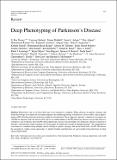Deep Phenotyping of Parkinson’s Disease
Author(s)
Dorsey, E. Ray; Omberg, Larsson; Waddell, Emma; Adams, Jamie L.; Adams, Roy; Ali, Mohammad Rafayet; Amodeo, Katherine; Arky, Abigail; Augustine, Erika F.; Dinesh, Karthik; Hoque, Mohammed Ehsan; Glidden, Alistair M.; Jensen-Roberts, Stella; Kabelac, Zachary; Katabi, Dina; Kieburtz, Karl; Kinel, Daniel R.; Little, Max; Lizarraga, Karlo J.; Myers, Taylor; Riggare, Sara; Rosero, Spencer Z.; Saria, Suchi; Schifitto, Giovanni; Schneider, Ruth B.; Sharma, Gaurav; Shoulson, Ira; Stevenson, E. Anna; Tarolli, Christopher G.; Luo, Jiebo; McDermott, Michael P.; ... Show more Show less
DownloadPublished version (855.9Kb)
Publisher with Creative Commons License
Publisher with Creative Commons License
Creative Commons Attribution
Terms of use
Metadata
Show full item recordAbstract
Phenotype is the set of observable traits of an organism or condition. While advances in genetics, imaging, and molecular biology have improved our understanding of the underlying biology of Parkinson's disease (PD), clinical phenotyping of PD still relies primarily on history and physical examination. These subjective, episodic, categorical assessments are valuable for diagnosis and care but have left gaps in our understanding of the PD phenotype. Sensors can provide objective, continuous, real-world data about the PD clinical phenotype, increase our knowledge of its pathology, enhance evaluation of therapies, and ultimately, improve patient care. In this paper, we explore the concept of deep phenotyping - the comprehensive assessment of a condition using multiple clinical, biological, genetic, imaging, and sensor-based tools - for PD. We discuss the rationale for, outline current approaches to, identify benefits and limitations of, and consider future directions for deep clinical phenotyping.
Date issued
2020-07Department
Massachusetts Institute of Technology. Computer Science and Artificial Intelligence LaboratoryJournal
Journal of Parkinson's Disease
Publisher
IOS Press
Citation
Dorsey, E. Ray et al. "Deep Phenotyping of Parkinson’s Disease." 10, 3 (July 2020): 855-873 © 2020 IOS Press and the authors
Version: Final published version
ISSN
1877-7171
1877-718X